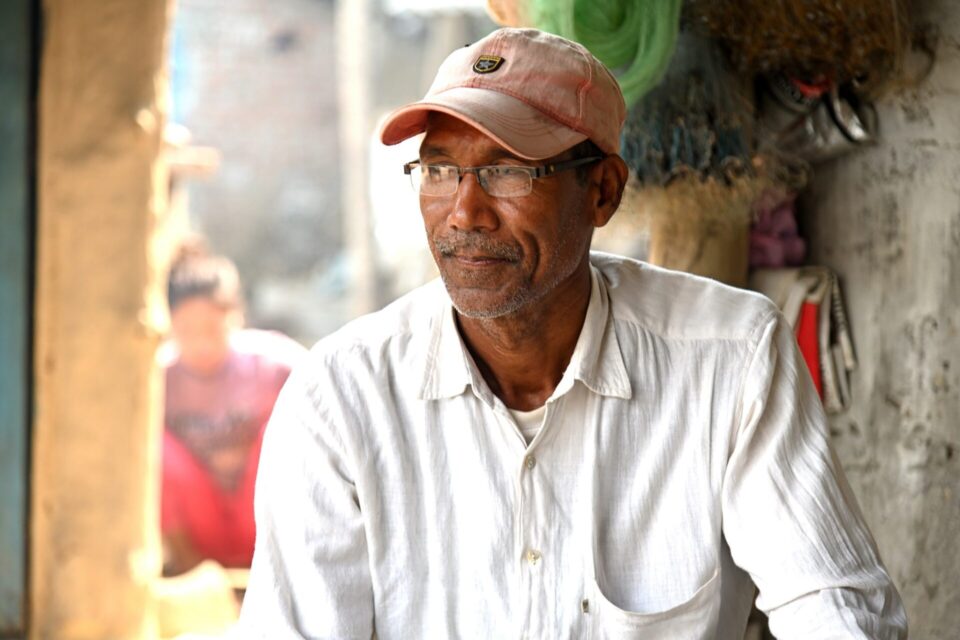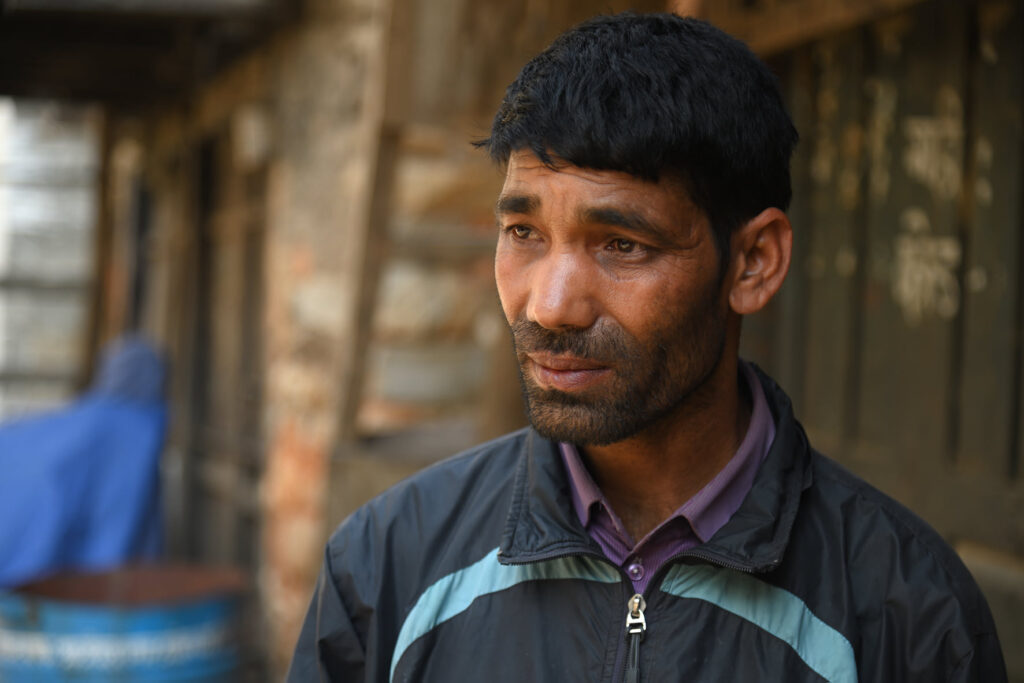
Shanti Sonaha Murghauwa, Bardia
“I served as the chairman of Sonaha Development Society. I had taken initiatives to bring the program of Pani project to our community. I had applied for the program twice. However, our proposal wasn’t approved. Anyway, I requested and was able to convince them that Sonaha is a marginalised community. Since conserving aquatic animals is the major objective of the Pani project, our community will be affected badly when they are depleted. Therefore, we had to be one of the beneficiaries of the program. They agreed and we are successfully implementing the program. We have started vegetable and integrated fish farming in various groups with the support of the program. There are no written testimonials of the history of the Sonaha community. But I can say that we have different customs, traditions and revered gods. It is neither similar to Tharu community nor goes with the other cultures of hills. However, the Government of Nepal hasn’t listed us as a separate culture yet. When they were doing the ethnic listing, our people didn’t bother to make enough follow up and even didn’t know in which government agency they had submitted documents that justify our separate identity. We filed a case in the Supreme court in 2015. After two years of hearing, it has given a verdict to list us as a separate ethnic group. However, its implementation hasn’t been materialised yet because of unstable government and the recent corona crisis. Indigenously, we depend on fishing and panning gold in the riverside for our livelihood. Many of us are still practising this; not all have left the profession yet. Despite many challenges, they are still continuing the work. You see, such works are prohibited in areas near National Park and some community forest groups had captured those areas. In between those areas, which does not come under anyone’s jurisdiction, Sonaha are giving continuity to fishing and panning gold. With the support of the Pani project, we have initiated agriculture and fish farming. Since the activities have recently started, results are yet to come. Digging deeper into the history of the Sonaha community, I had tried hard to study our origin. However, I couldn’t find any written history, despite much effort. Although I traced back to 7-8 generations, I couldn’t find our origin. It is believed that we have been staying in this surrounding for a very long time. Even the Tharu settlement of hills wasn’t here when we inhabited this place as it was deserted with all forest. Some Indians used to come here to herd cattles and make a shed to live temporarily. However, they return to their place with the arrival of Spring season. Even those people from hills, who used to come in exchange for salt and oil, return home before the spring because of the havoc of malaria and cholera in this area. Despite all the odds, Sonahas dwelt here. The communities of Sonaha used to be large during those days. Because of the Malaria and Cholera epidemic, the entire community at several villages perished.
There are several sub-castes (called gotra) of Sonahas. Each of them has a separate settlements. Those places are named after their gotra. Even though Sonahas no longer exist there, the name of those places has stayed. Sonaha never stayed at one place for long initially. Like the Raute and Kusunda community, Sonaha used to migrate from place to place. As they get fertile soil, they sow maize and other grains for a few years and then migrate to another place. However, they made sure that they settled near rivers. Since there were no irrigation facilities during those days, they seldom relied entirely on farming. Only after Tharu communities came from Dang, irrigation canals were made and people started farming. Gradually our ancestors also owned a few hectares of property. Twist in the story came during the 1960s when the government decided to register every land in use. During those days, few members of Tharu community spread a rumour that the government will collect tax for keeping the private property and those who can’t pay tax will be penalised. Therefore, we needed to submit the ownership of our land to a landlord as we can’t pay tax. Scared, our grandfathers also let their land be registered for landlord Poshannath Upadhya when the government officials measured our land as well. In that way, land and properties of the entire village were registered under one person. He eventually invited his relatives from Pyuthan and Salyan districts to sell the properties in a meager ten to twenty rupees. Our grandfathers could have faced an ill fate. Thanks to the new policy of the government which protected the rights of those who till the land. As per the policy, a quarter of the land can be claimed by the tiller for three generations. While some complied with the policy and claimed the remaining piece of land, some were happy to write off their right for a bottle of liquor. In that way, a great injustice was done to our community making us landless.Story on how our community started to pan gold from sand is also like a myth with no written testimonials. I remember, when I was a kid of 12-13 years, an old woman aged around 80-90 years had shared with us that we are the descendants of Thakuri clan. One of our Thakuri ancestors got hitched with a Majhi girl belonging to a fisherman clan. At the time when stringent untouchable caste systems were practised, the Thakuri community didn’t accept it and hence banished him from their community. Being banished from the community, the man mixed the two gotras – Thakuri and Majhi and formed another clan Jalthakuri. Since there were very few working opportunities, he adopted his wife’s ancestral profession of fishing. In that way, a new culture of Jalthakuri was formed. Once two people of the Jalthakuri clan went fishing at night as the catch is high in the dark. They slept near the bank of the river after dinner. A group of gods came and asked the two guys to help them cross the river. Scared, they helped the gods cross the river without hesitation. Impressed with their service, one of the goddess threw some golds to them as their fee. While they spread their palms hastily, some of the gold spilled on the ground. The gods suggested not to try collecting the spilled golds, as some goons are following them, who could bring troubles. Leaving the spilled golds, they returned home the very night on their boat. Coming back to the village they narrated the story of the incident they had just witnessed. As they told them about the spot where golds were spilled, all the villagers started panning sands to get golds. Although they didn’t get the lost gold, they were able to extract natural gold particles. As their profession grew, they decided to change their caste name from Jalthakuri to Sonaha which literally means goldminer. Sonahas are spread in three districts of Nepal – Bardiya, Kailali and Kanchanpur, all near the bank of the river. Although they still do fishing at Mahakali river at Kanchanpur, the profession of panning gold is almost forgotten there, as gold has been rare in those areas. Anyway, several Sonaha families of Bardia and Kailali are still dependent on gold for livelihood. There are still 20-25 families in the Rajapur area carrying out the profession.Unsustainable riverbed mining has affected our profession badly. Excavators have dug large pits everywhere disturbing the habitats of fish. Our fishing nets would get stuck at their spikes and would tear down. Moreover, they excavate all the sands and gravels which are our raw material of gold. Therefore, both of our professions of fishing and panning gold are in danger now. If the government doesn’t care about it, the day might come when the Sonahas will become history. We at Sonaha Development Society have been raising this issue to the concerned authorities. You see, Sonahas can’t imagine their life without fish and gold. So I had lobbied the government to assign a section of the river to Sonahas so that they can earn their living from it and conserve the fish at the same time. But no one would heed me.I have proposed this idea to the Pani project and also to the local and province government. But instead of supporting it, people of my own community label it impossible for the government to assign a section of river to only one community. If it really happens, it will be a lifeline to keep up with the profession of Sonaha community. I just heard that government officials have awarded contracts to extract gold using machines. Since such machines would do work equivalent to that of thousands of Sonahas, our profession is sure to become extinct now. No one has raised this issue; not even us because our voice won’t be heard. That’s the reason why many of us are operating homestay now and are gradually seeking alternative sources of livelihood in the society.”
(Shanti Sonaha, Murghauwa, Bardia)





